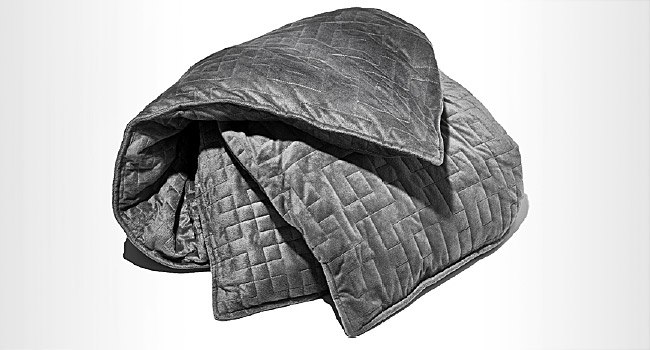Weighted Blankets: From Fad to Mainstream
Falling asleep wasn’t the problem for Aubrianna Veitz, 27, of Pittsburgh. “However, staying asleep was difficult,” she says. “I tend to toss and turn in the night and sometimes would wake up with anxiety.”
She didn’t want to take sleep medication, so when a friend said a weighted blanket had eased her anxiety, Veitz ordered one. Since she began sleeping under it in July 2018, she has noticed a big improvement. “I wake up in the same position that I fell asleep in, and I also don’t have anxiety attacks waking me up,” she says.
Weighted blankets, viewed as a fad just a few years ago, are now mainstream.
While features vary, the blankets are usually filled with plastic pellets to add weight, usually ranging from about 4 to 25 pounds. The ideal weight depends on a person’s own weight.
Time magazine called one of them, the Gravity Blanket, “One of Time‘s best invention sof 2018.” In a write-up, Time said:”If you’re wondering why everybody on Instagram seems to be draped in weighted blankets, you can thank Gravity.” Time noted that while the company didn’t invent weighted blankets — they’ve been used for many years to calm adults and children with anxiety, autism, and attention problems — it did perfect mass-marketing. The startup raised nearly $5 million on Kickstarter in a matter of months in 2017.
These days, Gravity has plenty of competition. In 2018, experts estimated that a half-dozen or so companies were producing weighted blankets. By the spring of 2019, the list has grown past two dozen. Big names like Gravity, Mosaic,SensaCalm, YnM and Beautyrest share the market with many other companies,including Sensory Goods, Peace, ZonLi, and Grandpa’s Garden.
Target entered the market with its Pillowfort weighted blankets in late 2018,responding to customers who wanted more affordable products for their children who had special needs, says Kristen Mezzenga, a company spokeswoman. At $49.99,it costs a fraction of what some others do.
Now,Walmart, too, has joined the fray, with a number of weighted blankets that range in price from $29 to $130 and more.
The range of options has grown with the market. Options now include waterproof models. For sweaty sleepers, there are cooling weighted blankets that promise to wick moisture away from the body.
“Weare seeing a demand for larger weighted blankets,” says Laura LeMond,owner and co-founder of Mosaic Weighted Blankets.
Gravity Blankets is into bundling — it is working with Calm, offering a 1-year subscription to the app for sleep, meditation, and relaxation help with the purchase of a $249 weighted blanket.
Even though the blankets are getting more popular, scientific research is still sparse. Much of the research is industry-funded, such as one paid for by blanket makers. It found that after using the blanket for 2 weeks, 31 men and women who had moderate insomnia reported a calmer night’s sleep with fewermovements.In another study, researchers studied 32 adults who used weighted blankets. It found that 63% reported less anxiety and 78%preferred the weighted blanket as a way to calm down.
